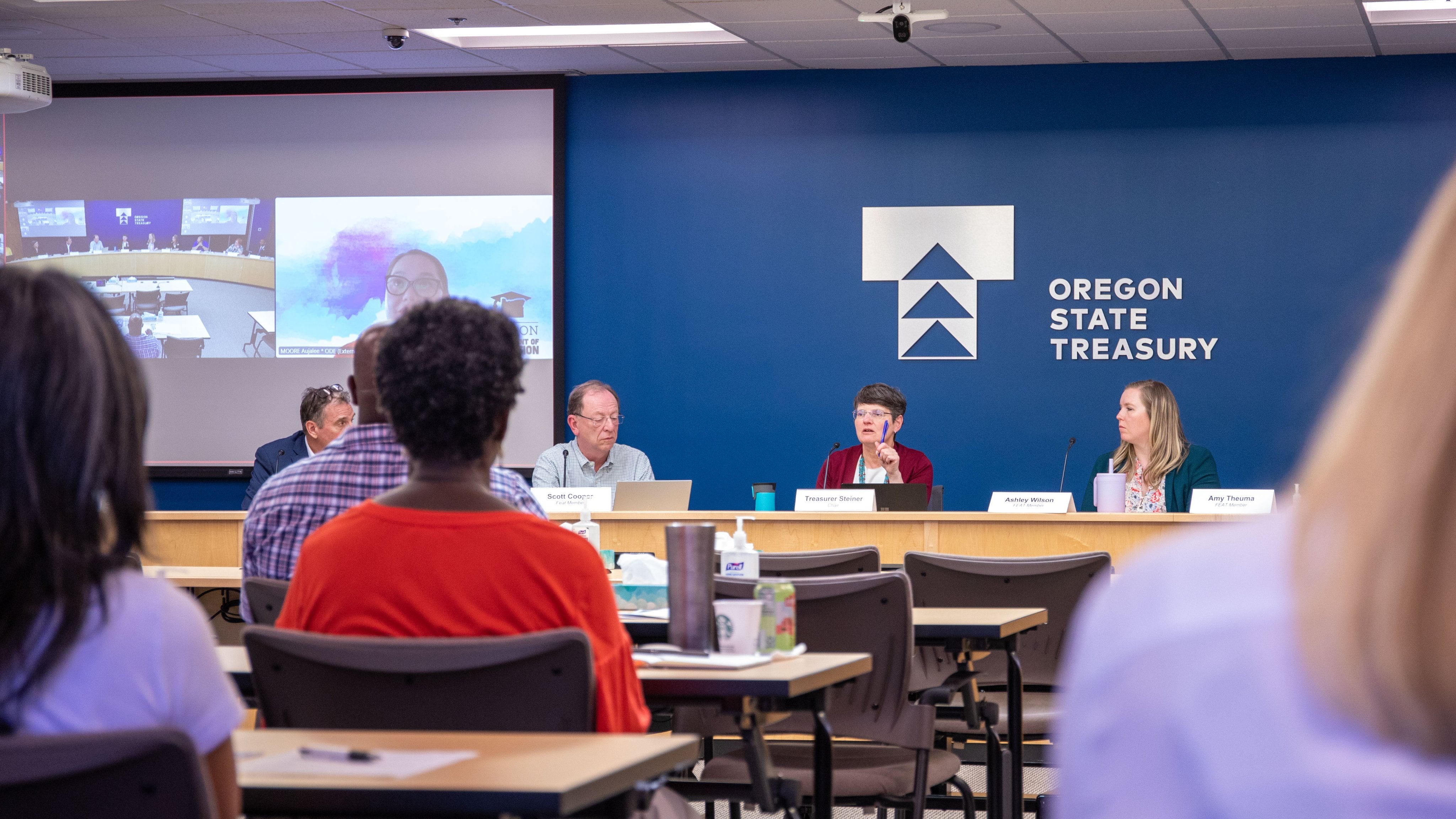This story was produced by the Oregon Journalism Project, a nonprofit newsroom covering the state.
At a recent public meeting about the financial health of OPERF, the $100 billion Oregon Public Employees Retirement System Fund, an activist criticized the Oregon State Treasury for losing money when it recently sold $4.5 billion in private equity holdings from the fund.
State Treasurer Elizabeth Steiner responded sharply. She told the activist, Rick Pope of Divest Oregon, that he had no idea how much PERS made or lost on the sales because the prices were not public information.
“You don’t know—nor are we allowed to disclose specifically what we get,” Steiner told him at the Sept. 3 meeting of the Oregon Investment Council, which was streamed live from the State Treasury’s Tigard headquarters. Turning to the wider audience, she said, “It’s really important for people in the public to be aware that there are things we are not able to disclose legally.”
It may surprise Oregon workers, particularly the 415,000 who rely on OPERF for current or future retirement benefits, that although the state tells them down to the penny what the returns are for stocks and bonds in their PERS holdings, they have no right to the same information about their private equity investments. Instead, the treasury reports the annual rate of return on all private equity as a whole. The opaque, high-fee investments make up more than one-quarter of the $100 billion fund and have collectively underperformed their benchmarks for years, unlike stocks, bonds and fixed income funds.
Oregon workers and the public have nothing to rely on other than trust when Steiner says, as she did at the Sept. 3 meeting: “We have made money over time on all of those investments that we then sold, for most of them, and we sold them at a very good rate.”
OJP submitted a public records request for treasury documents that would support Steiner’s statement, but treasury staff denied it, citing an exemption under Oregon public records law.
As it turns out, financial interests successfully lobbied the Oregon Legislature decades ago, as they did lawmakers in all 49 other states, to pass laws that forbade disclosing publicly how much individual private investments made as well as other financial information. The firms claimed such information constituted trade secrets.
“Public money, by law, is supposed to be subject to public scrutiny,” says Edward Siedle, a former U.S. Securities and Exchange Commission attorney whose law firm conducts financial investigations of pension funds for retirees and beneficiaries. “Private investment managers refuse to submit themselves to the public. They want to manage public money for hefty fees, but they don’t want to be subject to public scrutiny.”
State Rep. Mark Gamba (D-Milwaukie) says the secrecy “is something that’s always made me uncomfortable.” Not having the full picture about fees, actual returns, and whether funds own fossil fuel interests, he adds, “is the biggest red flag about having so much invested in private equity.”
John Russell, a former chair of the Oregon Investment Council, which sets investment policy for the state, says such secrecy has actually created greater risk. “It’s volatile. It’s opaque. That’s a problem. You can’t ask TPG”—a huge private equity firm—“what they’re going to do with your money. You can’t even ask TPG what they have done with your money. It’s designed to be opaque.”
>>READ MORE: How the managers of Oregon’s $100 billion pension fund ignored expert guidance and lost big.
Private equity is a form of investment created by financial firms that buy private companies, typically with borrowed money; cut costs and seek improvements; then sell them later, hopefully at a profit. The firms, such as Blackstone, Carlyle Group, and KKR, typically charge investors an annual 2% fee and take 20% of the profits.
A recent OJP investigation found that Oregon, against the advice of its own consultants, has been investing too much in private equity and not enough in stocks and bonds. In 2024 alone, according to an earlier analysis by OJP, PERS would have made approximately $1.4 billion more had it followed the investment advice of its own experts.
Rex Kim, the State Treasury’s chief investment officer, has defended his approach to private equity. He’s said his team invests for the long term, over decades of market cycles that show private equity beats the stock market.
Though most Oregonians don’t have a public pension, the success of the fund impacts their quality of life and their families’ futures, in large part because PERS charges public employers, such as cities, counties and school districts, 27 cents on top of every payroll dollar, then gives the money to OPERF to invest.
When PERS investments perform poorly, as they have with private equity over several years, Oregon’s 904 public agencies have to pay more to cover retiree benefits, which means less money for working teachers, firefighters, and other vital public employees.
During the Sept. 3 meeting, renowned investor Howard Marks, co-founder of Oaktree Capital Management, took questions from Treasurer Steiner, staff and the council.
Asked by Kim about private investments, Marks noted that private equity firms have thrived in the past on low interest rates, which allowed them to buy companies with cheap borrowed money. But the low interest rates of past decades are over, Marks said.
“I believe very strongly that in the decade ahead, we’re not going to see consistently declining rates...and it ain’t going back there, in my opinion,” he said. “So I don’t think it’s a given, Rex, that private investing is going to have the same superior returns as it has in the past.”
As a final note, Marks reiterated: “Nobody’s that crazy about private equity anymore.”
Whether the State Treasury and the Oregon Investment Council lower the percentage of OPERF money they invest in private equity going forward remains to be seen. Steiner said the topic would be discussed next year as part of a planned review.

